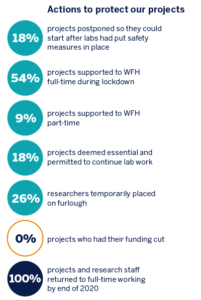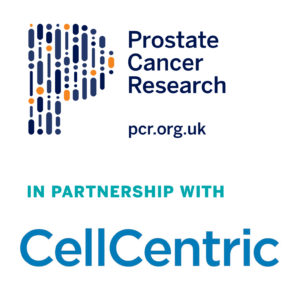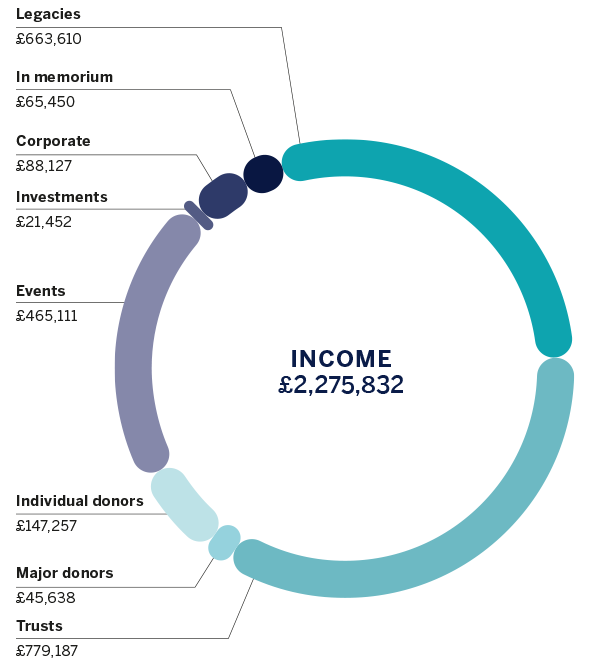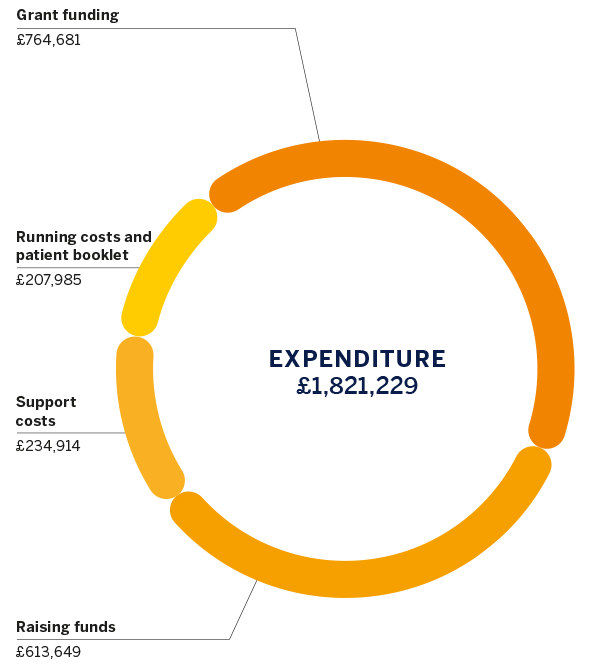- Posted: 17 March 2021
- Tagged: PCR News
What we achieved in 2020
Resilience in a crisis
Chief Executive's Statement
PCR CEO, Oliver Kemp, discussed the significant progress we made in 2020, despite the COVID-19 pandemic.
At PCR, we have been focusing on becoming both better connected with the researchers we fund and more agile as an organisation. These qualities became incredibly important when the COVID-19 pandemic hit.
We changed our goals for 2020 in March as we knew fundraising would be more challenging during lockdowns. Instead, we dedicated our time to what we were still able to do, and worked hard to keeping our research going. Overall, we achieved all the of the new goals we set ourselves.
We never had to cut a project or research budget. In fact, we even launched a grant call for new research projects. We were pleased to be able to offer this essential funding to scientists in a year where many couldn’t.
“We also connected more deeply with patients by expanding our
Oliver Kemp
patient webinars, carried out a rebrand on a shoe string budget,
launched PCR Inc. in the US and investigated how we could launch
the first cancer-specific translational fund to help ensure good
ideas get translated into real benefits for patients.
PCR CEO
Mitigating the impact of COVID-19
Within research
There is an urgent need to develop breakthrough treatments for men with prostate cancer, and research is how we will achieve this. The COVID-19 pandemic has increased the urgency by causing significant delays to cancer diagnosis and treatment.
We supported our scientists throughout the pandemic, in addition to running a new grant call to provide a funding opportunity during a period when there was little available.

For patients
As prostate cancer patients are at higher risk from COVID-19, we worked hard to quickly provide information to prostate cancer patients regarding their health and safety in the pandemic. We published a patient story from a gentleman who attended a hospital appointment during the pandemic to reassure other patients about safety measures.
We also ran a survey to better understand patient experiences and plan to use this information to build better patient information programmes.
![]()
4 Zoom calls, with appearances by 7 scientists and attended by 126 patients and supporters
![]()
37 men with prostate cancer engaged in an online research community led by two experienced researchers for 14 days
![]()
28 patient panellists reviewed our 2020 shortlist and helped us decide what new research to fund in 2021
Achievements 2020 & Targets 2021
GOLD STANDARD: Fostering innovation through research
![]()
- We completed our analysis of the funding gaps in prostate cancer.
- We will now run grant calls focusing on black men, who are at significantly higher risk and have worse outcomes, on the gaps in the science, and focused on career stages at which scientists most struggle to get funding. We will also make our first investments in translational research, helping move good ideas into the clinic.
ASSEMBLING EXPERTS: Strengthening internal structure and processes
![]()
- We made new appointments to our Scientific Advisory Committee and Board of Trustees to fill any gaps in experience and skills.
- We improved our contracts to ensure junior scientists get fairer recognition for their work.
- We will continue to analyse and assess our skills and experience and fill gaps that may exist in our Scientific Advisory Committee, Executive Advisory Group and Board of Trustees.
CONTINOUS LEARNING: Learning and connecting
![]()
- We ran internal workshops on agility, strategy, and science to help us respond better to the pandemic and remain connected to our mission.
- We dramatically increased our connections
to patients, through live (pre-pandemic) and
virtual interactions, increased information
provision though our website and booklet, and
engaging patients in an online study. - We will continue to invest in training internally, maintaining expenditure at double the sector average.
LEADING AUTHORITY: Positioning PCR as a thought leader
![]()
- We spoke at two large pharmaceutical events about best practice in involving patients.
- We were shortlisted for the Charity of the Year Change Project of the Year award.
- We will continue to create relationships and build partnerships to raise our profile.
FORM PARTNERSHIPS: Leveraging partnerships
![]()
- We signed contracts with two complementary prostate cancer charities and established regular catch-ups to align priorities and strategy with two other cancer research funders.
- We will expand our pilot work with biotechs to ensure that the patient voice is translated into the development of new treatments and diagnostics.
SUSTAINABLE GROWTH: Sustainable growth
![]()
- We were able to expand to funding 14 projects.
- We adjusted our 2020 income goals, given we couldn’t carry out community fundraising due to the Covid-19 pandemic, and we achieved our modified non-legacy income.
- In 2021/22, we will run new grant calls to increase the number of projects we fund to 18.
What Our Scientists Achieved
Despite COVID-19, our scientists continued to strive forwards, from identifying potential drugs that stop resistant androgen receptors, to confirming aggressive prostate cancer subtypes. In addition, we started funding three new scientists, all focussing on bone metastasis in prostate cancer.



Meet Dr Helen Pearson, Dr Toby Phesse and Dr Jennifer Munkley

Partnerships
We are focused on forming partnerships with like-minded organisations. We hope these collaborations will help us to:
- address the areas of unmet need in prostate cancer
- develop drugs through shared knowledge
- place patient voice at the heart of advances in the prostate cancer field
In 2020, we formed a partnership with the biotechnology company CellCentric, to help them better understand patient needs in drug development.
We are also working on a number of upcoming partnerships that we are excited to reveal in 2021.
How we fund our research


In spite of a challenging year for the whole medical research sector, we are pleased with our overall financial performance. Although events and community activities were postponed or cancelled we have found that donors have remained generous and supportive. Many of our larger donors have retained or increased their donations, and trusts and foundations have continued to give in spite of the uncertainty. We have also invested in growth and expect to be back to above pre-pandemic levels in the next financial year. Although some expenditure on research didn’t happen due to circumstances outside of our control, at no time did we have to reduce grant funding or stop any research. We have also spent some of our funds on new initiatives, such as a new patient engagement tool to help shape the latest prostate cancer research and ensure the patient voice is heard and magnified. Finally, we have completed setting up an office in the US, which is projected to make £300,000 to be spent on new research next year.
“Our existing research projects, along with the new awards that we intend to make later this year, will continue to progress through major milestones, getting ever closer to new treatments for men with prostate cancer.
Matthew Ellis
PCR Chairman
You can access our full report and accounts here:

